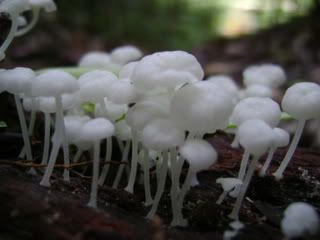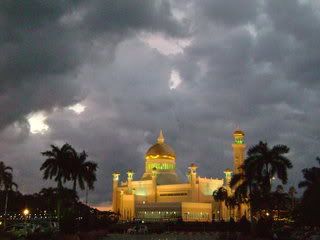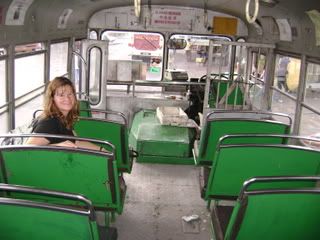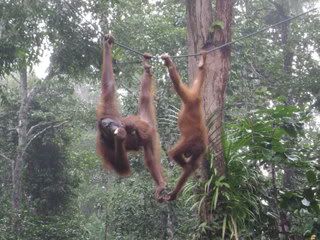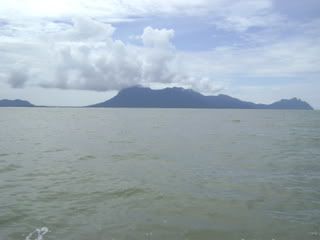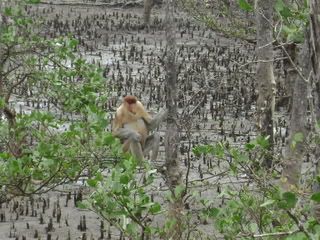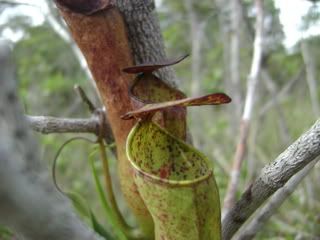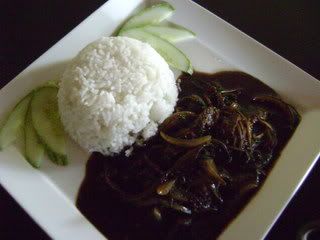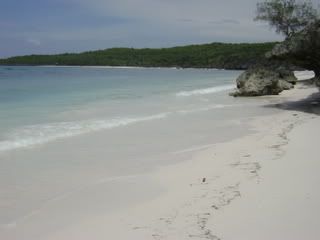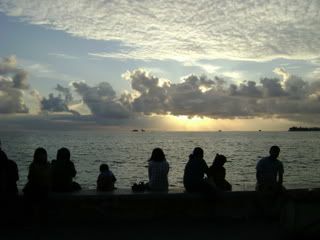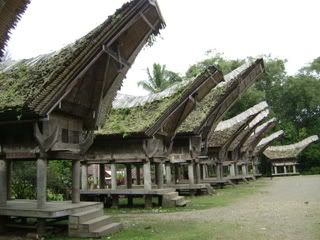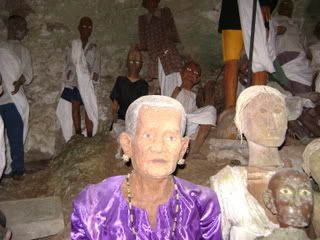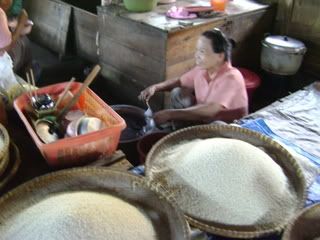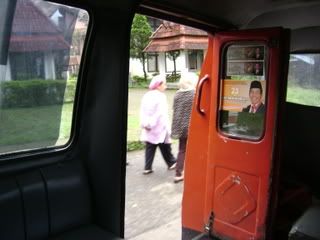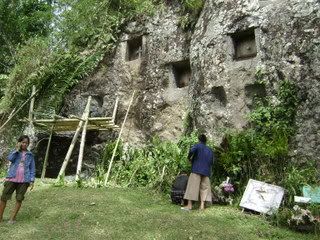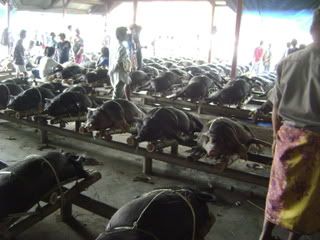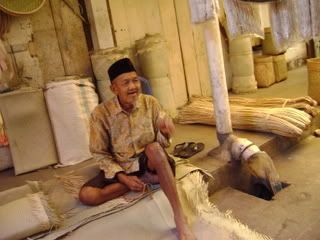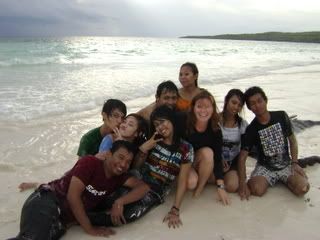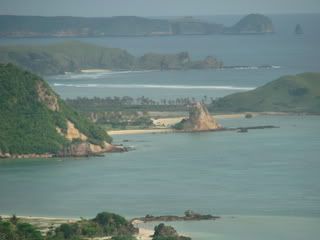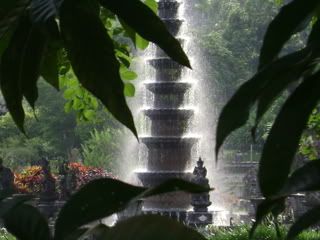
Today is day 216 of our trip. For the most part, the clothes we are traveling with today are the same as those we started out with back on July 15. For me, that comes to four t-shirts, three shorts, three short sleeve button downs, one long pants, four underwear and four socks. Due to the heat here, however, I never wear the pants and can not wear two of the button downs.
(tea and bananas on the floating village)
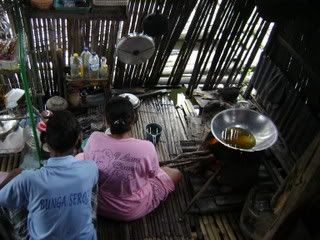
We try to do laundry as often as it's possible -- usually that means being in one place for more than a night, as it takes a long time for stuff to dry here. We do our laundry by hand, using a long block of soap you can buy in markets here for about 30 cents. Still, despite the frequent laundering, stuff is starting to stink. More than once we've walked into our hotel room only to ask each other, What is that smell? Well, it's our stuff. We stink. The clothes, after a while, just don't come clean, and they're starting to fall apart, too. We're in a slow rot down here, sort of like a science experiment I had in fifth grade where I buried various things in damp dirt and documented how long they would take to decompose. That's it -- we are decomposing.
We are just wrapping up a two week circuit of south Sulawesi. Sulawesi is likely among the toughest places I've ever traveled -- and I include Africa in that. It's not just that the roads are awful, or that the transport schizophrenic, or that the hotels basic, or that the restaurants really basic ... it's all of it together. It's really been an exhausting, trying, stressful and dirty two weeks.
Not that it has not also been scenic, though.
We started out the trip in Makassar, the island's half-flooded capital and largest city, at 1.8 million. Like so many other big third world cities, the people who run Makassar seem bent on creating hell on earth. It's a city of smog, endless trash-burning fires, open sewers, mountains of trash, really shitty hotels, restaurants where rats run through the dining room and endless snarls of traffic.
We first went to Malino, a small town high in the mountains reached by a bone jarring three hour ride. Huge storms swayed the trees and knocked the power out, making for a fun time, but unfortunately there was only one hotel there and it was expensive, so we just spent a night before returning.
We then went to Tana Toraja ("Land of the Mountain People"). This area, about 200 miles north of Makassar, is made up of piercing mountains and small villagess. The Toraja are Christian, but hold on to their animist beliefs, the most peculiar of which revolve around death.
The funeral of a loved one kicks off a seven day celebration where people come and play cards, drink coffee and slaughter buffalo. (We were present at a funeral during a buffalo slaughter. If any of you are at my funeral, please do not slaughter any buffalo for me.) Buffalo are a centerpiece of Torajan culture, but are raised solely for slaughter during funerals. The more you slaughter, the better the funeral. Because of this, and the cost of buffalo (cheap ones are about $100) the family sometimes waits a year between death and funeral. During this time, the body is kept in the house and treated as a sick person, not a dead person. Meanwhile, children are responsible for raising the buffalo. After school they walk them, feed them special grass and wash them.
Torajan dead are buried in caves dug from mountainsides. Digging a cave (by hand, naturally) takes about six months (and costs one buffalo). The dead are carried to the caves in replicas of Torajan homes, which are meant to mimic the boats Torajan ancestors sailed to Sulawesi on, with a soaring bow and stern. If more than a dozen buffalo were slaughtered at the funeral, the dead is memorialized with an effigy -- a carved wooden doll which stands guard in a carved pedastal near the cave entrance (cost: one buffalo).
We saw this all on a two day tour we took with a guide, and it left me a bit numb, and I guess that's why this post may seem more seem like a guide book description of what I saw rather then something more fluent.
From Tana Toraja we pieced together bemos (minivans hollowed out and filled with seats) and Kiangs (two-wheel drive Toyota SUVs stuffed with up to 12 people) to make it to Sengkeng. Sengkeng is a small city on the shores of Lake Tempe. We checked into the nicest hotel we could find but still spent a good part of the evening trying to keep rats out of our room. The next day we took a boat tour of the lake. As the dry land of the city ends streets continue into the water; cars and motos are replaced by boats, and the homes stand on stilts. We weaved through channels cut into thick lily growth, and then broke into open water. In the middle of the lake was a small village of floating homes. The small homes float on cut bamboo and are anchored in place. Fishermen here live simple lives; we went into one home and were served tea and fried bananas. We spent a quite hour sitting in the shade before heading back.
From Sengkeng we continued south into unexplored terriroty (read: it's not in the guide book) and pieced together a bus and bemo to make a 10-hour trip to Bira. Bira is the end of the mainland in southern Sulawesi. I'm not really a fan of beaches, but this was a cut above your average third-world beach. Trash was swept into piles (and burned, plastic and all, after sunset), and past the main hotel area was a long sweep of blazing white sand bordered by palms and cliffs falling into the water. We walked at low tide around the rocks to find more deserted beaches and more palms reaching over the water. We had a wooden shack on the beach and simple meals and all the strong, sweet coffee we could drink. Nice spot.
We have a flight out of Makassar to Borneo, but we stayed an extra day in Bira because it was so nice. The morning of our departure the hotel manager offered to help us get a bemo direct from Bira to Makassar, which would save a bemo transfer in Bolumkumba, the nearest big town. But he came back a few minutes later with a sour look on his face and told us there was a demonstration which was halting all transport along the south coast between Bira and Makassar.
This was hard to understand, but if it was true it was potentially catastrophic. The demonstration, he told us, had been going on for two days and there was not telling how much longer it would last. There was a bemo headed for Bolumkumba just as he gave us the news, so we hopped in it in hopes we could learn more there.
In Bolumkumba everyone at the bus station told us it was impossible to continue east, towards the city (now about 120 miles away), but with the help of a local, the bemo driver took us the to outskirts of the city where we were able to catch a bemo headed east. We drove with the windows closed and our heads down to the next town, where we were again dropped off on the other side of town. Here we waited in a restaurant for a bus which was possibly scheduled to swing through. A bus came and went without stopping for us and we started walking and in a few minutes caught another bemo headed east. This ride went smoothly for about an hour until we came to a demonstration blocking the road. We kept our heads down though a bus ahead of us was stopped and turned around. As we drove past, a fight broke out among some of the men standing along the road. A few minutes later another demonstration, this time with a man in a mask holding what appeared to be a knife at vehicles passing through. At this point we were pretty scared -- the demonstration must be more serious than we thought. We did however make it to the next town and from there caught a bemo which more or less (less, actually) took us into the center of Makassar.
Oh Makassar! Never before have I been so happy to be back in such a dump in all my life.
Somewhere along the way we picked up a pretty detailed map of south Sulawesi, and it was useful in yesterday's bemo hop. I was looking at it later and realized how much there is to see here. Sulawesi has 11,000-foot mountains -- tall enough for snow -- and hundreds of islands, named and unnamed. But the truth is, seeing the "main" tourist sites, which is what we did, is hard enough. I can't imagine how difficult it would be to see the really remote stuff. This is just a difficult island.
Hopefully things will get a bit easier from here on out. We head to the Malaysian side of Borneo in the morning. We don't have a ticket off the island but are thinking of a short hop to the Philippines before heading to mainland Asia. From there we'll make our way up to Bangkok.
Posting photos, and even stories, is becoming increasingly difficult and frustrating and I honestly don't know how much patience I have for it, so if you don't see another post for a while, you'll know what happened.
